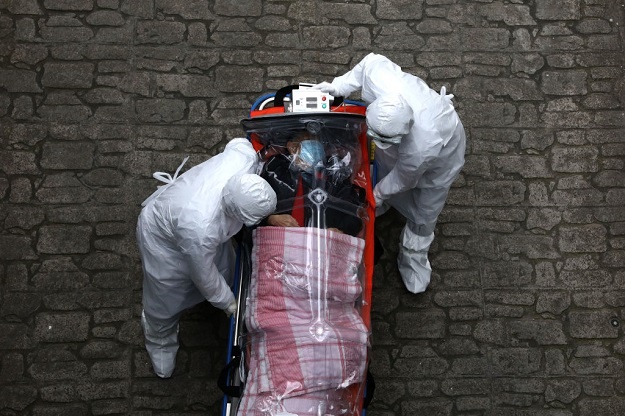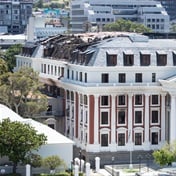
Covid-19 models released by the government on Monday night show worrying signs that the government's strategy has been reduced to "digging graves", one of South Africa's foremost health experts has warned.
Professor Alex van den Heever, chair in the field of Social Security Systems Administration and Management Studies at Wits University, appeared on News24's Frontline interview series on Wednesday morning.
He said the models showed the government was on its way to realising its worst-case scenario, and appeared to have little planning strategies in place, except creating more hospital beds.
READ | Private hospital group expects high number of Covid-19 patients
Van den Heever was responding to models made available by government on Wednesday night. It showed the country could face around 40 000 deaths by the end of November, and at least 1 million Covid-19 cases. It also showed that, in both the optimistic and pessimistic scenarios, the country did not have enough ICU beds.
"When you reduce your strategy to trying to create hospital beds, you're effectively reduced your strategy to digging graves," Van den Heever told News24.
"It's essentially an indication of failure, because your worst-case contingency has been realised, which is an epidemic at such a level that you don't really have the ability to contain it," he said.
"What this is suggesting is that our only strategy is to get more beds, not to actually to introduce better intervention to suppress the epidemic; better non-therapeutic interventions."
Models not a crystal ball
Van den Heever was at pains to emphasise that the models are not set in stone and should not be seen as a hard-and-fast prediction of what's to come.
"Models themselves are not crystal balls - they are not attempts to see the future and they shouldn't be used or seen like that," he said, adding that they are not used for forecasting.
"The international literature shows that epidemiological forecasting is about 25 years behind weather forecasting," Van den Heever said.
"We have to be extremely cautious about assuming that this is what's going to happen…
"In most cases, we really only know what's going to happen a short period into the future and all you're doing is extrapolating. And the further in time you extrapolate, the less reliable your results are," he said.
The Covid-19 models revealed on Monday night make predictions from the end of May until November.
He said models could not be the "fundamental determinant" in future planning, and that, in modelling, it was "critical" to make clear what is not known.
"Models create the appearance of certainty, but it is often far from certain," he said, adding that the further into the future the model attempts to predict, the less certain it is.
What matters, he said, is how the government uses the models to plan.
"It's a good thing that the model has been made available, but the question is really how is it being used in the policy making process?"
Lockdown not reduced substantially
The models revealed on Monday appear to reveal something worrying about the government's planning, he said.
"The model that's produced suggests that there's a surge and a peak sometime in September. And I've never seen a trajectory like that in other countries, certainly not after a lockdown. Usually, after a lockdown, you've suppressed the epidemic substantially."
But when it shows that the lockdown has just reduced the amplitude of the epidemic, and not reduced it substantially, "it confuses me", he said.
"It doesn't appear to be the way it has worked elsewhere and it also doesn't appear to be a rational way of assessing our policy options."It has been eminently possible for us to suppress the epidemic using testing and tracing, for instance, and we failed basically to implement that at scale."
He said that, right now, the public health laboratories alone should be testing about 36 000 to 40 000 a day. But, without a significant increase in tests, he said this has essentially been "taken out of our tool kit for the moment as a major method of suppressing the epidemic".
If testing and tracing are introduced early, it is an option, but if the epidemic "runs away from you", it is no longer an option as a strategy.
He said that, as a result of this, it is not clear whether the testing and tracing method is a feasible way of suppressing the epidemic.
This is the kind of thing that the models should be used to assess, he added.
Balanced-risk approach
Also, a balanced-risk approach appears not to have taken place, he said.
Van den Heever said this should include the risk to the economy, which is costing R13 billion per day, he said.
This should be weighed up against the cost of ramping up testing and tracing, which would cost about R20 billion per year.
While implementing a hard lockdown for the first two to three weeks was appropriate, he said, a lockdown-dependent strategy would always fail.
ALSO READ | These are SA's 7 worst-hit Covid-19 districts
Van den Heever said that, whatever the alternative strategy to the generalised lockdown was now, "it's worth it".
The other problem with the model was the aggregate nature of it, he warned, which divorces it from the reality of the epidemic, which was likely to be localised to high-density areas.
South Africa should move away from a "crude to a smart strategy", he said, with targeted interventions in densely populated places.
Van den Heever also voiced concern about the lack of a strategy document being made public, as had been done in other countries, and said this raised suspicions that there was no strategy that could be shared.
Concerns from scientists that they had not been listened to were also worrying, he said, as this also showed that they were not being asked the right questions.
Scientists should not be used as "window-dressing" to further the policy choices of the government, he said.




 Publications
Publications
 Partners
Partners

























